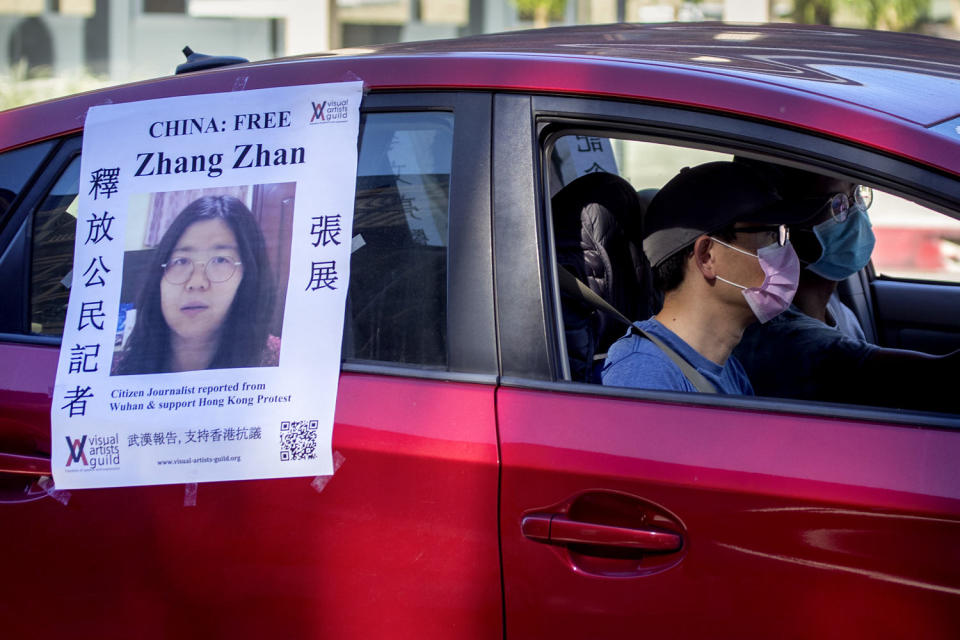Chinese woman jailed over Covid reporting in Wuhan is set to be freed
HONG KONG — A Chinese citizen journalist who was jailed over her reporting on the early days of the Covid-19 pandemic was due to be released Monday after four years in prison, supporters said.
Zhang Zhan, a former lawyer from Shanghai, went to the central Chinese city of Wuhan in February 2020 to cover the growing outbreak and the government’s effort to contain it. Information was tightly controlled by the ruling Chinese Communist Party, and reporting by citizen journalists like Zhang, now 40, drew widespread attention as the world braced for the coronavirus to spread.
In May 2020, Zhang was arrested for “picking quarrels and provoking trouble,” a vaguely defined crime that is often used to silence government critics. A Shanghai court later sentenced her to four years in prison b.
During Zhang’s time in prison, her family, friends and supporters had feared she could die from periodic hunger strikes she staged in protest of her conviction and treatment, reporting in 2021 that she weighed less than 90 pounds.
Jane Wang, a U.K.-based activist, said Monday there had been no confirmation of Zhang’s release, which was expected based on a court verdict that was obtained and published by rights groups.
“I understand that her parents and brother have been under enormous pressure and warned severely not to give media interviews. Friends’ calls are also left without answers,” she told NBC News, calling them “extremely worrying signs.”
While the conditions of Zhang’s release remain unclear, Wang and other supporters say she could be under close surveillance and subject to other restrictions.
If, like other Chinese activists, Zhang is placed under house arrest after she is released from prison, “she will have little chance of getting urgently needed, long overdue medical treatment and recuperation,” Wang said.
Amnesty International said it was concerned that Zhang’s ability to travel or make contact with relatives and others could be severely limited.
“The Chinese government’s jailing of Zhang Zhan has been a shameful assault on her human rights, and her release must mark a new beginning,” Sarah Brooks, Amnesty International’s China director, said in a statement.
A Chinese Foreign Affairs Ministry spokesperson said Monday that he was not aware of the specific case.
“Anyone who violates the law should be subject to legal sanctions,” spokesperson Wang Wenbin said at a regular news briefing in Beijing. “At the same time, China fully guarantees the legitimate rights of defendants and prisoners in accordance with the law.”
Zhang was one of at least 10 Chinese journalists and commentators who were silenced early in the pandemic after they pressured Chinese authorities to be more transparent. While some others were released, Zhang remained in prison even as China abruptly lifted some of the world’s strictest pandemic rules in late 2022, leading Covid-19 to tear through the population.
According to the press freedom advocacy group Reporters Without Borders, which gave Zhang its 2021 Prize for Courage, 109 journalists are detained in China, making it the world’s biggest jailer of journalists and media workers. China ranked 172nd out of 180 countries and territories in the group’s World Press Freedom Index released this month.
Zhang had previously challenged Chinese authorities, including in September 2019, when she displayed an umbrella in downtown Shanghai calling for an end to the Communist Party’s monopoly on power. She was detained for more than two months, going on a hunger strike during that time. She was released in November that year, weeks before Covid-19 was first detected in Wuhan.

Zhang arrived in Wuhan soon after the government put the city’s 11 million residents on lockdown on Jan. 23, 2020, sharing images of empty stores and crowded hospitals on YouTube, the Chinese social media platform WeChat and what was then known as Twitter.
“I really didn’t know anything medical,” she told an independent filmmaker in an interview shortly before she was arrested that was shared with NBC News. “I just followed my heart.”
Even though Zhang was not a journalist, she said in one video that she wanted to speak for those who were struggling economically or were not allowed to mourn the deaths of loved ones from Covid-19.
“They are already burdened with death,” she said, “and now they are oppressed.”
This article was originally published on NBCNews.com

